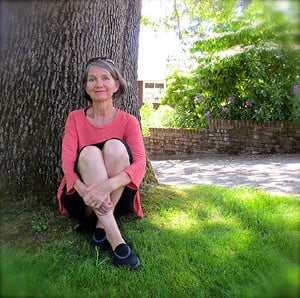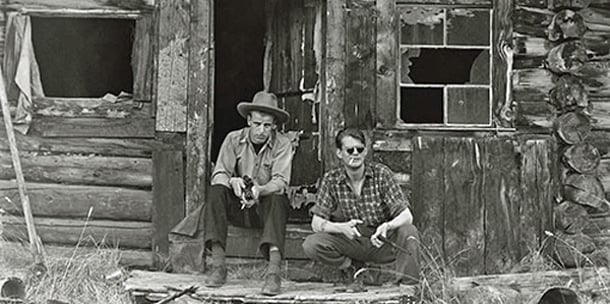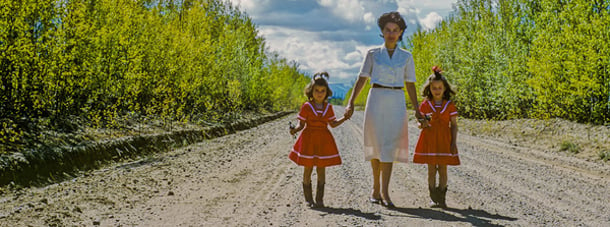
[Editor's note: The story of how Alicia Priest wrote her lively new memoir, A Rock Fell on the Moon, is as brave and spirited as the book itself. We're republishing this Tyee interview to help preview an upcoming reading by Alicia at the Vancouver Public Library Central branch this Thursday, Dec. 11 at 7 p.m. It's free, and author proceeds go to ALS Canada and the Canadian Parks and Wilderness Society's Yukon chapter. More details here.]
Alicia Priest is a Victoria-based journalist, registered nurse and the wisecracking daughter of a Mennonite immigrant and a charismatic thief.
But in 2011, at the age of 58, she got some unexpected and shitty news.
A rather humourless neurologist examined her increasingly cold and weakening hand "with the bedside manner of a toad" and announced that the energetic Priest probably had ALS.
Now, as anyone who has dumped a bucket of cold water on themselves lately will tell you, ALS is a "relentless, neuromuscular-destroying mutation that results in total body paralysis and death, usually by suffocation, starvation or suicide."
Receiving the diagnosis is, as Priest will bluntly add, a bit like watching snow melt in the Sahara, getting your face smashed by an exploding airbag, or discovering that your favourite cookie has indeed crumbled to dust. (You must read her frank and spirited account.)
But Priest picked her soul off the ground. She then reassembled the melted and crumbled bits with the sort of grace humans once had in abundance. And then she started to run against the ultimate deadline.
It has been a helluva of a sprint.
For two years she tracked down the remarkable history of her family, which took root in a silver mining town in the Yukon.
Priest had always wanted to write about this quintessential Canadian tale of frontiers, crime and illusions. ALS provided a deadline.
With the support and encouragement of her husband and investigative journalist Ben Parfitt, she typed as fast as she could before the muscle-wasting disease atrophied her fingers.
In the process she lost her voice first and then her ability to swallow (Parfitt now feeds her with a tube). But Priest kept on typing.
But at end, she won that damn race against ALS.
This September, Priest published a beautifully written memoir that evokes a Canada long past, and that left me in tears.
"Writing this book was what I had to do to survive," she recently told The Province newspaper.
A Rock Fell on the Moon tells the grand story of Priest's wayward father, a sweet-tongued man who dreamed big. Indeed, Gerald Priest almost carried off one of the largest silver heists in the history of Canada, with emphasis on almost.
Gerald, the subject of a massive RCMP investigation, eventually served time in jail. His machinations also took a heavy toll on the family.

To date, the book has received nothing but accolades. One reviewer called it "heartbreaking, hilarious and suspenseful."
It deservedly sits on the B.C. bestseller list. At three separate launches in Victoria, Vancouver and Whitehorse, the publisher actually ran out of books, and how silly is that.
Parfitt did most of the talking at the book launches, while Priest provided the autographs and joke-slinging: be forewarned she comes armed with a writing board. (You won't find anyone with a more wicked sense of humour than Alicia Priest.)
In Whitehorse, more than 100 prospectors, geologists, old-timers and friends came out to the emotional event. With the last remaining strength in her fingers, Priest patiently signed books for two hours.
The crowd just loved the fact that the Elsa, Yukon-born Priest was telling "a story about the Yukon that nobody knew anything about," said Parfitt.
"It meant an awful lot to Alicia to be in the company of people who appreciated the land and some of the characters in her story," he said.
It apparently meant so much that even the northern lights electrified the sky that night. I'm sure the poet Robert Service would have approved.
The Tyee recently caught up with the busy Priest and tabled some questions about her book and life. The spirited author typed back these lucid answers several days later.
Tyee: Your book is highly evocative and brought back memories for me about growing up in the sixties in Canada, everything from Kodak cameras to buckskin jackets. Was Canada a better or more innocent nation then?
Priest: "Yes and no, and here come my biases: it was better in many ways. More wilderness, more wildlife, less people, less exploitation of the natural world, and less apathy and cynicism. It was also a smaller nation in a smaller world, and as E.F. Schumacher so brilliantly argued in 1973, small is beautiful. It was also worse in many ways: more racism, more sexism, more cruelty and sanctioned prejudice. I wouldn't describe Canada as more innocent so much as more naive and ignorant."
Your father makes for a rather remarkable character. He is charming yet conniving. Did you intend for your book to be a rumination on daughters and fathers?
"I didn't intend my book to be so. But writing is an organic process and it evolved into just that. Inevitable, when I explored how our relationship developed and changed."
What does it mean to discover that one's parent masterminded the largest silver heist in the history of Canada?
"I don't know, other than the mastermind was and always will be my father. I wish he'd gotten away with it."
One of my favourite chapters is about your remarkable parents, "this disparate twosome." What do you think your mother, Helen, saw in Gerry?
"His attractions were many, especially to an impoverished new immigrant with a trusting and gullible nature. He was tall, handsome, and clever, and told her what she wanted to hear. Her marriage to a ‘real Canadian' was also her rebellion against the strict Mennonite expectations her birth culture imposed on her."
How does criminal activity affect a family in the long term?

"I can only speak for my family. In many respects, my father's error in judgment and his post-internment actions scarred all of us for life. After many years, my wounds have healed, but I cannot say the same for others."
Readers of this book, and there will be many, will walk away with an intimate portrait of family in mining nation in the 1960s. What aspect of the book do you hope will resonate most strongly with readers? Or what do you want them to walk away with?
"Three things: I hope readers enjoy a good read; encounter a lost northern community and the joys of a simpler yet infinitely rich way of life; and perhaps ponder the momentous decision of choosing a mate."
Much of the story takes place in Elsa, a mining town that no longer exists in the Yukon. Do you still dream about the mountains and emerald skies?
"Oh, that barely scratches the surface of my dreams. Add downy beds of snow, winter skies flaming with ribbons of light, spring run-off when the very ground beneath your feet melted, summer days that lasted into the night, birdsong and wild cranberries, crimson hills of autumn ushering in yet another glorious winter."
Not too many people faced with the ultimate deadline, death, take the time to sum up the meaning of their lives and their place in the scheme of things. Yet you've done so with this wonderful book. How does that feel and why was it so important?
"Finally, the time to release what was brewing inside me for decades was mine. Because I'd completed much of the research before my diagnosis and because I was diagnosed fairly early, I still had the ability to talk and write almost normally. I also was luckier than some who are diagnosed with ALS, who lose the ability to do much of anything in only a matter of months. Telling my story was a form of survival for me. No one else would tell it, and to me it is more than a personal memoir -- it is Canadian history. Now that it's out, it feels great!"
Writing a book is a semi-pathological experience at the best of times. I can't imagine writing a book with ALS or as you call this cruel disease, Always Losing Something. What was that like?
"As a trained journalist, I respond to pressure. Now I had a stern taskmaster berating me with the ultimate deadline. And the deeper I dug, the more motivated I became. It wasn't a cakewalk though. I had days when I felt like chucking the whole mess. And what a mess it was at times. But I had my cheerleaders. Most of all I had Ben who never stopped believing in me. I couldn't let him down, could I?" ![]()
Read more: Media
















Tyee Commenting Guidelines
Comments that violate guidelines risk being deleted, and violations may result in a temporary or permanent user ban. Maintain the spirit of good conversation to stay in the discussion.
*Please note The Tyee is not a forum for spreading misinformation about COVID-19, denying its existence or minimizing its risk to public health.
Do:
Do not: